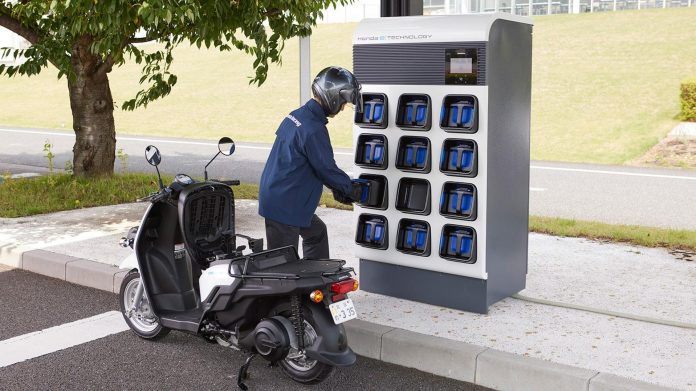Introduction: This policy aims to reduce pollution and promote sustainable transportation by encouraging the adoption of electric vehicles. The concept of swappable batteries for electric motorbikes is gaining traction in Pakistan as an innovative solution to enhance the practicality and convenience of electric vehicles.
The Pakistani government’s Electric Vehicle Policy 2020-25 provides incentives and support for developing electric vehicle infrastructure, including battery-swapping systems.
Key Players and Innovations: ZYP Technologies is a notable example in this space, launching the Magvus EV electric bike featuring a swappable battery system. This bike allows users to quickly replace a discharged battery with a fully charged one, minimizing downtime and making electric mobility more efficient. The Magvus EV offers a range of up to 150 kilometers on a single charge and includes modern features like a digital display and advanced safety systems.
EzBike, an Islamabad-based startup, has introduced Pakistan’s first electric scooter with a swappable battery system, known as the Electron. EzBike has established a network of battery swap stations, called ezSwap, in Islamabad and Rawalpindi, allowing users to quickly exchange depleted batteries for fully charged ones, enhancing the convenience and efficiency of electric scooters.
Global Influence
Globally, major motorcycle manufacturers such as Honda, Kawasaki, Suzuki, and Yamaha have been working on swappable battery technology through a joint venture called Gachaco. This initiative aims to standardize battery swapping and expand the necessary infrastructure to support the widespread adoption of electric two-wheelers. By providing shared battery services and promoting standardized swappable batteries, these companies are setting a precedent that could inspire similar efforts in Pakistan and other markets.
Benefits of Swappable Battery Systems: The implementation of swappable battery systems addresses significant challenges associated with electric vehicles, such as long charging times and limited range.
In Pakistan, this approach could significantly boost the adoption of electric motorbikes by making them more user-friendly and reducing concerns related to charging infrastructure.
Challenges in Implementation: Despite the promising advantages, several challenges remain in fully implementing swappable battery systems in Pakistan:
1. Infrastructure Development: Establishing a widespread network of battery swap stations requires significant investment and coordination. EzBike has started this process in Islamabad and Rawalpindi, but expanding nationwide will take time and resources.
2. Standardization: Ensuring compatibility between different brands and models of electric motorbikes is crucial. Currently, most initiatives are proprietary, which can limit scalability and user adoption.
3. Battery Technology: Advancements in battery technology, such as solid-state batteries, are essential for improving the range, safety, and lifespan of swappable batteries. However, these technologies are still under development and not yet widely available.
4. Economic Viability: The initial cost of setting up battery swap stations and producing compatible electric scooters can be high. Companies need to balance this with affordable pricing for consumers to ensure widespread adoption.
5. Policy and Regulation: Supportive government policies and incentives can play a significant role in accelerating the adoption of electric vehicles and the necessary infrastructure. While there are efforts to push for cleaner transportation options, more comprehensive policies are needed.
6. Consumer Acceptance: Convincing consumers of the reliability and safety of swappable batteries is crucial. Any incidents or perception of reduced performance compared to fixed batteries can hinder adoption. Educating users on the benefits and usage of swappable battery systems is necessary for widespread acceptance.
7. Technological Limitations: Ensuring that swappable batteries have a long life, high performance, and safety standards is essential. Batteries need to withstand frequent swapping and charging cycles without degradation.
8. Security Concerns: Preventing theft and ensuring the security of swappable batteries is a significant concern.
9. Environmental Considerations: Establishing effective recycling processes for used batteries to prevent environmental degradation and ensure sustainable practices is critical.
Conclusion: While the implementation of swappable battery systems for motorbikes offers promising advantages, addressing these challenges requires coordinated efforts from manufacturers, governments, and other stakeholders to ensure successful adoption and operation. Initiatives like those by ZYP Technologies and EzBike are paving the way for a more sustainable and convenient future in electric mobility in Pakistan.
With continued support and innovation, swappable battery systems could become a cornerstone of the country’s electric vehicle infrastructure, contributing to cleaner air and a reduction in greenhouse gas emissions.
By overcoming these hurdles and leveraging supportive policies, Pakistan can accelerate the transition to sustainable transportation, aligning with global trends and enhancing the quality of life for its citizens.
Written by Asif Mehmood for Automark Magazine and it has been published in June-2024 printed edition too.
